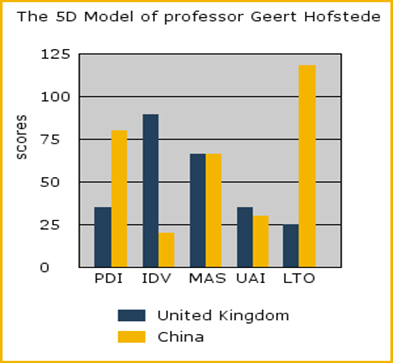Cultural Differences between UK and China and their implications on offshore team management in China
According to Hofstede’s model for cultural differences and analysis between China and UK, the following table has been produced in reference to the link provided.
Adopted from:
http://www.geert-hofstede.com/hofstede_dimensions.php?culture1=94&culture2=18#compare
According to power distance index, the Chinese understanding of power distribution and inequality is more than two times higher than the UK expectations. This indicates that the Chinese team management style is inclined to one person in the organization to have higher power than others and that person is perceived to be in a higher position than others.
And according to individualism aspect of the above table, theUKorganization culture tends to have more individualistic approach than that ofChina. This indicates that individualism is more developed inUKcompanies and team management than Chinese.
The reaction to risk in both countries tends to be in a very similar level.
However, in terms of planning, the UK culture indicates to have short term planning, whereas, the Chinese to be long term planning.
Based on above analysis, it can be concluded that the following type of management would be most appropriate to operate the business unit effectively in China:
- The management style similar to autocratic, where management tends to have more power to run the company as collectivism is highly appreciated in Chinese organizations. This indicates that subordinates are happy to follow the leader.
- In terms of planning skills of management, a manager with long term planning goals should be most appropriate here as Chinese management and employees tend to think well into future.
- Gender does not make big difference as both countries tend to have same levels of approach to genders, according to table above.
- Therefore, a person who can work collectively with others, more challenging towards others and risk aware would be ideal for the manager position here.
The person suitable for this position can be found in China without any difficulty as the company may hire a British expertise with relevant experience in Chinese company or a Chinese with sufficient experience in western companies. The reason for this is certainly because the ideal candidate should be able to work with both UK partners and Chinese partners effectively.
And the manager can also be trained for this position via sending them to specific training courses about culture and different styles of management training.

